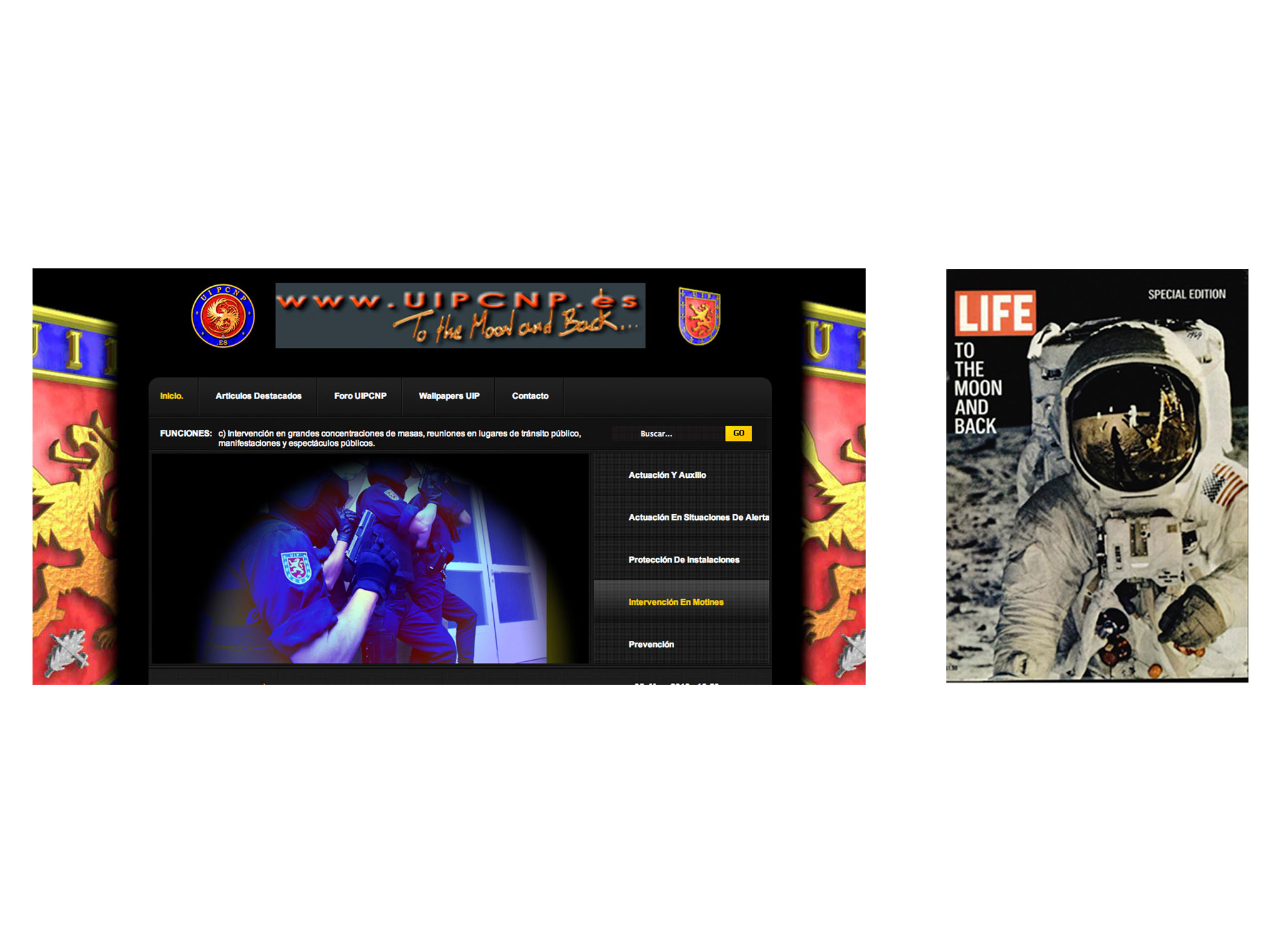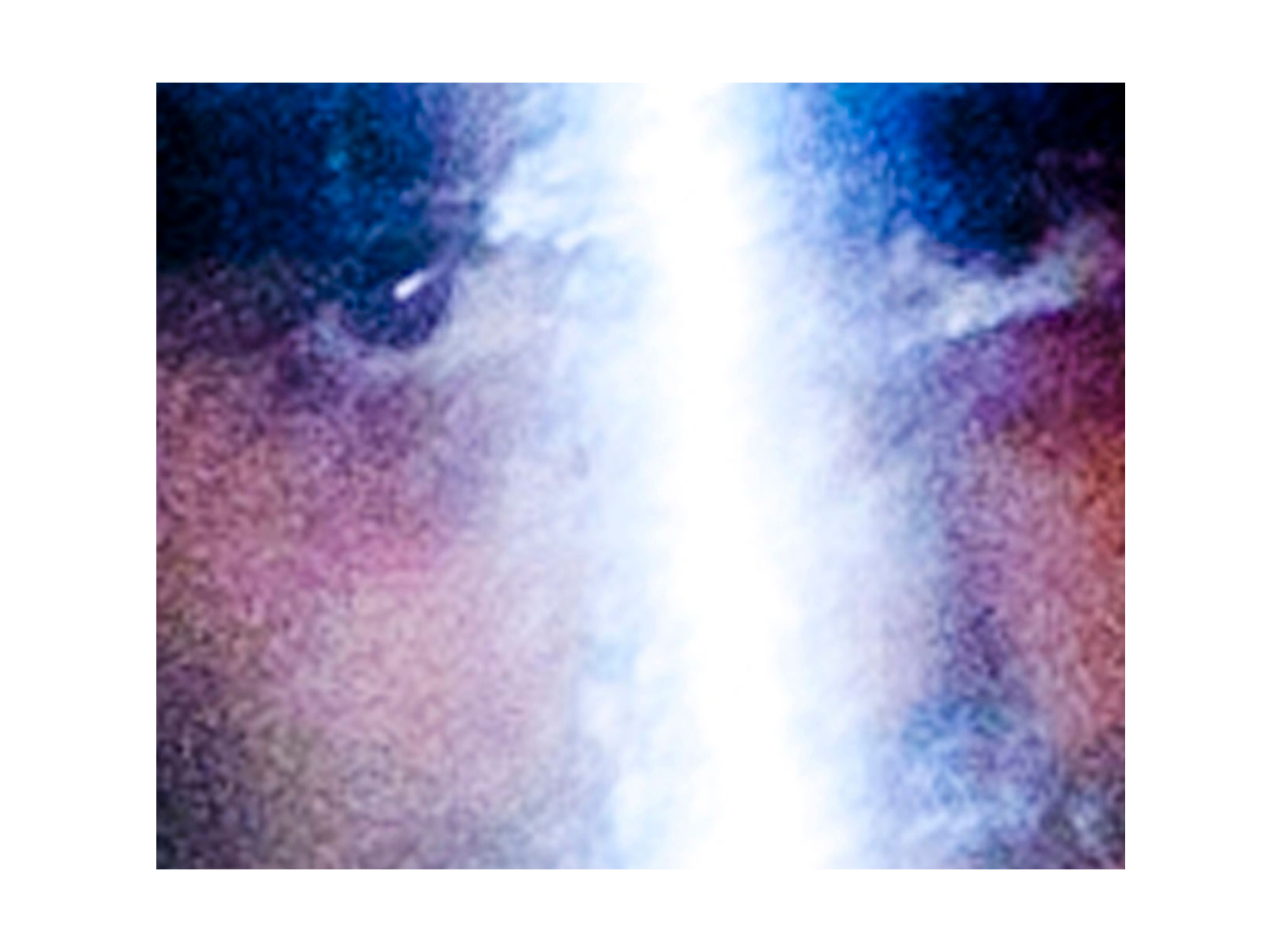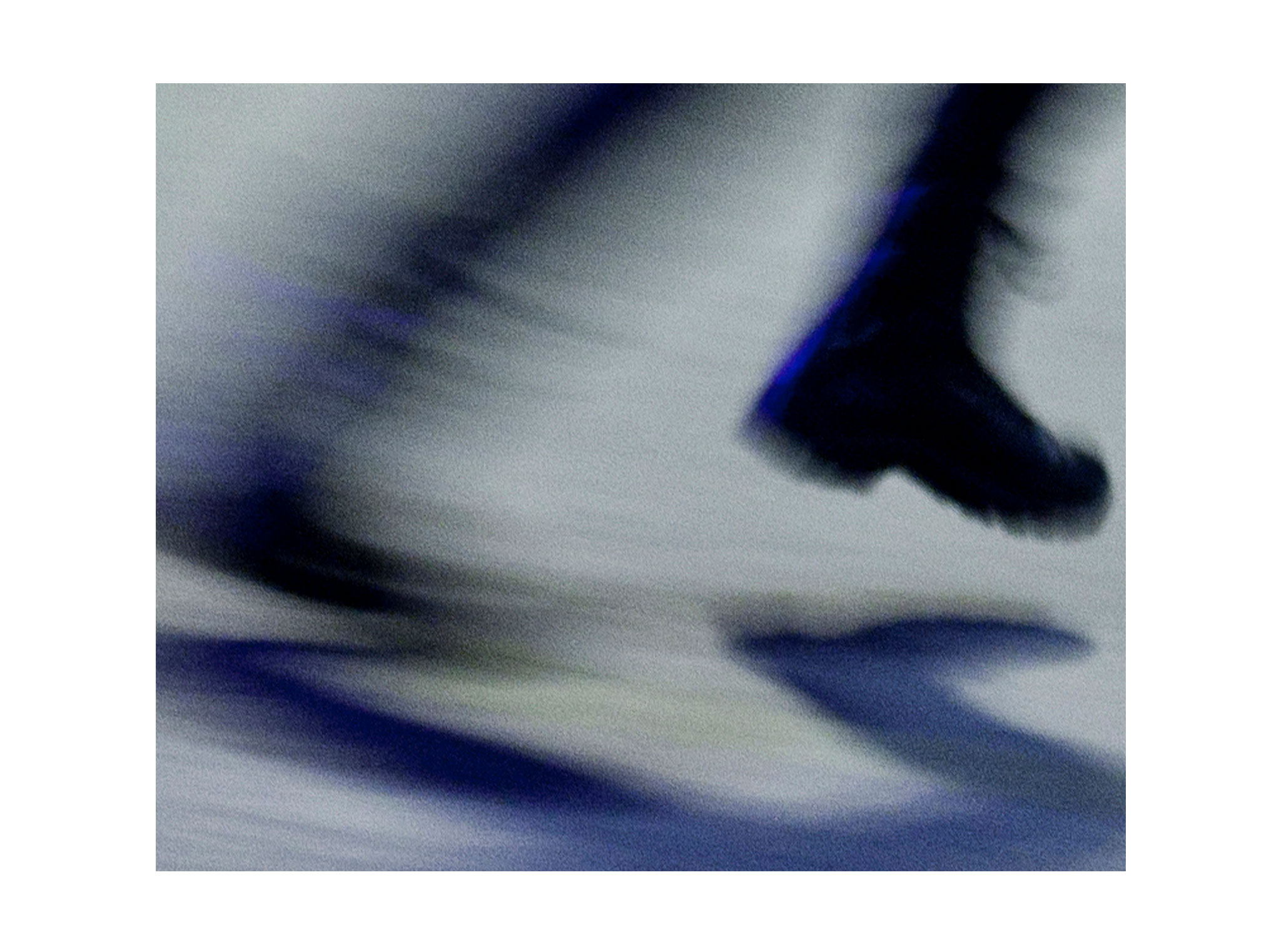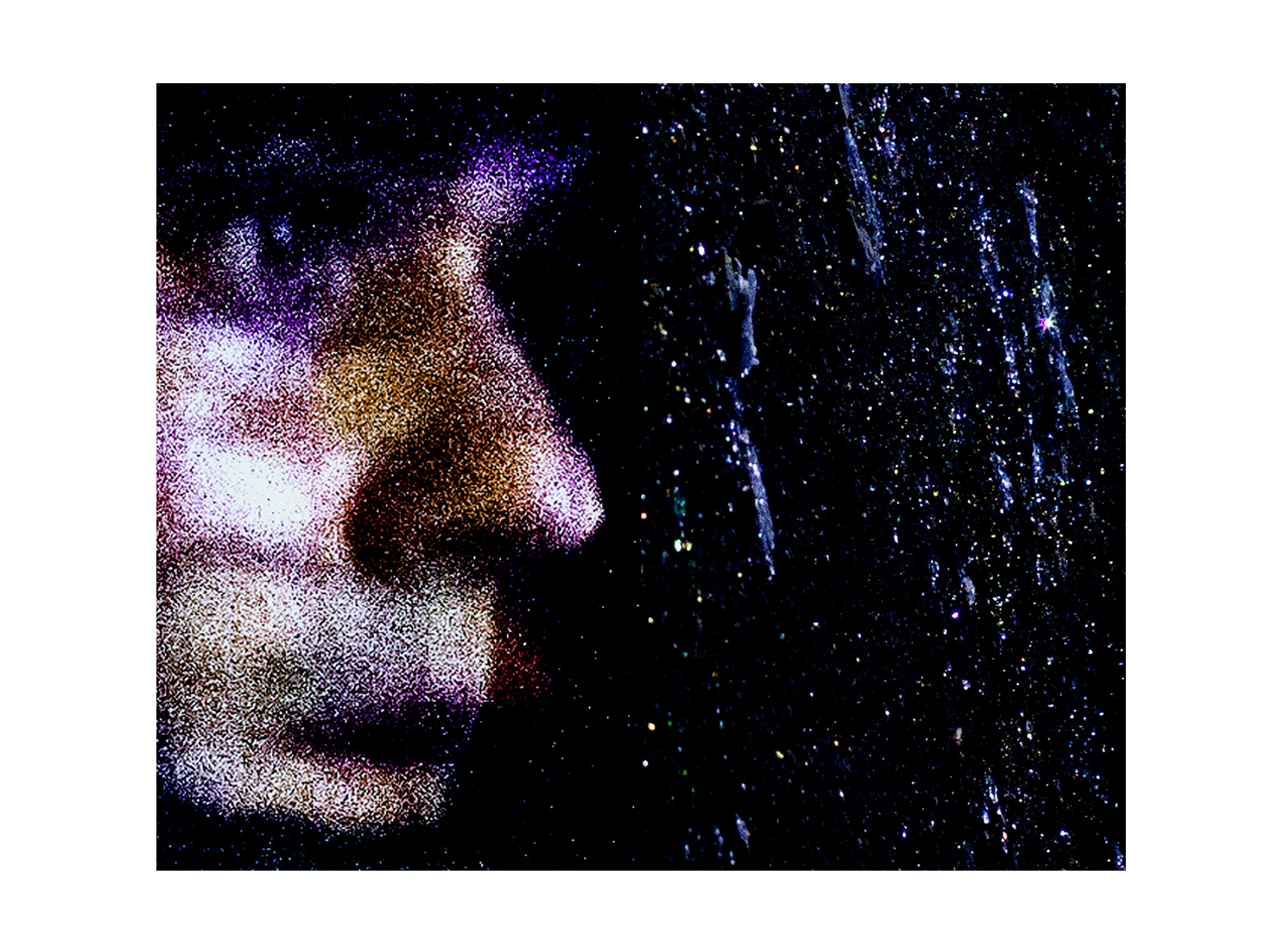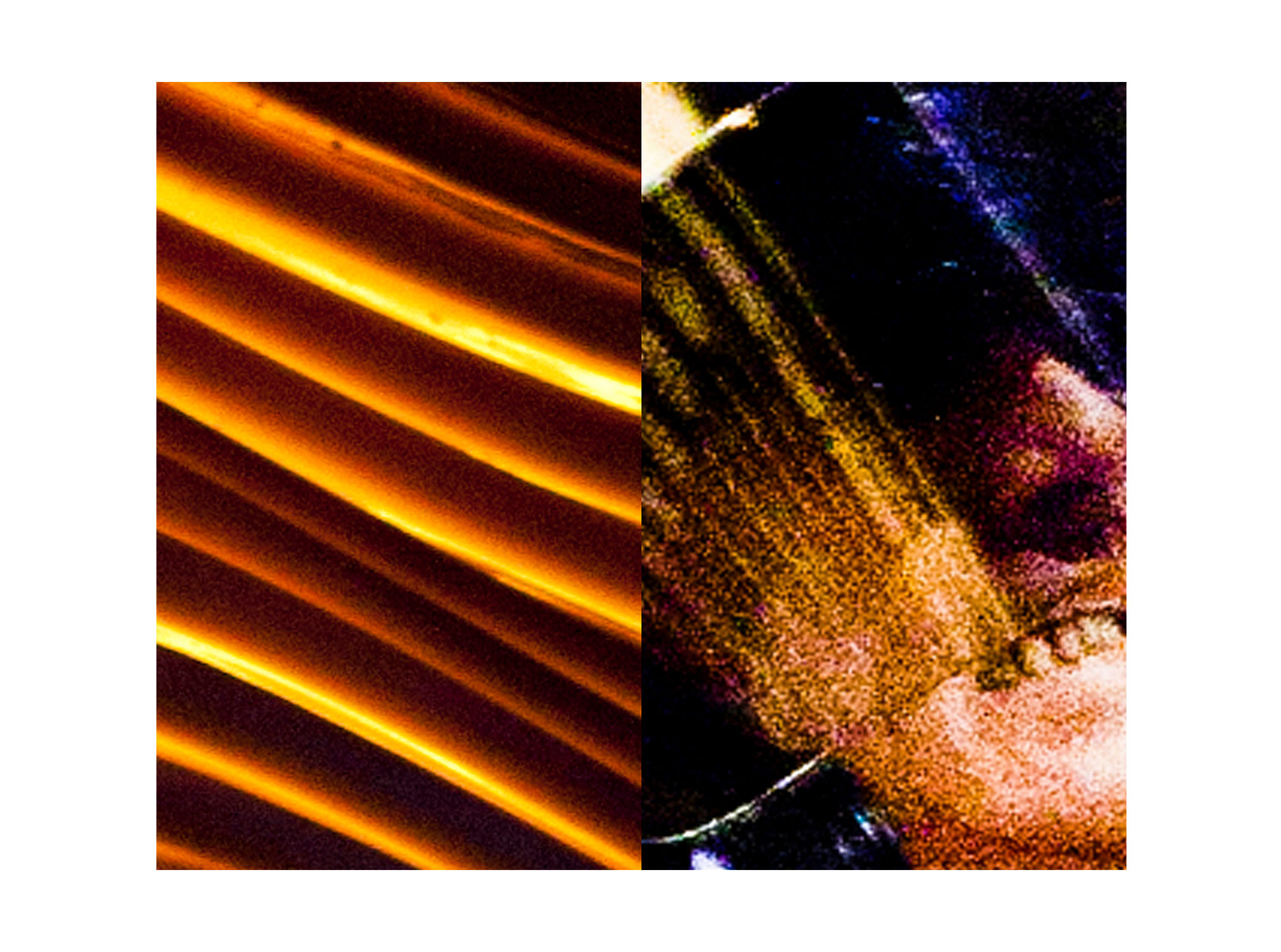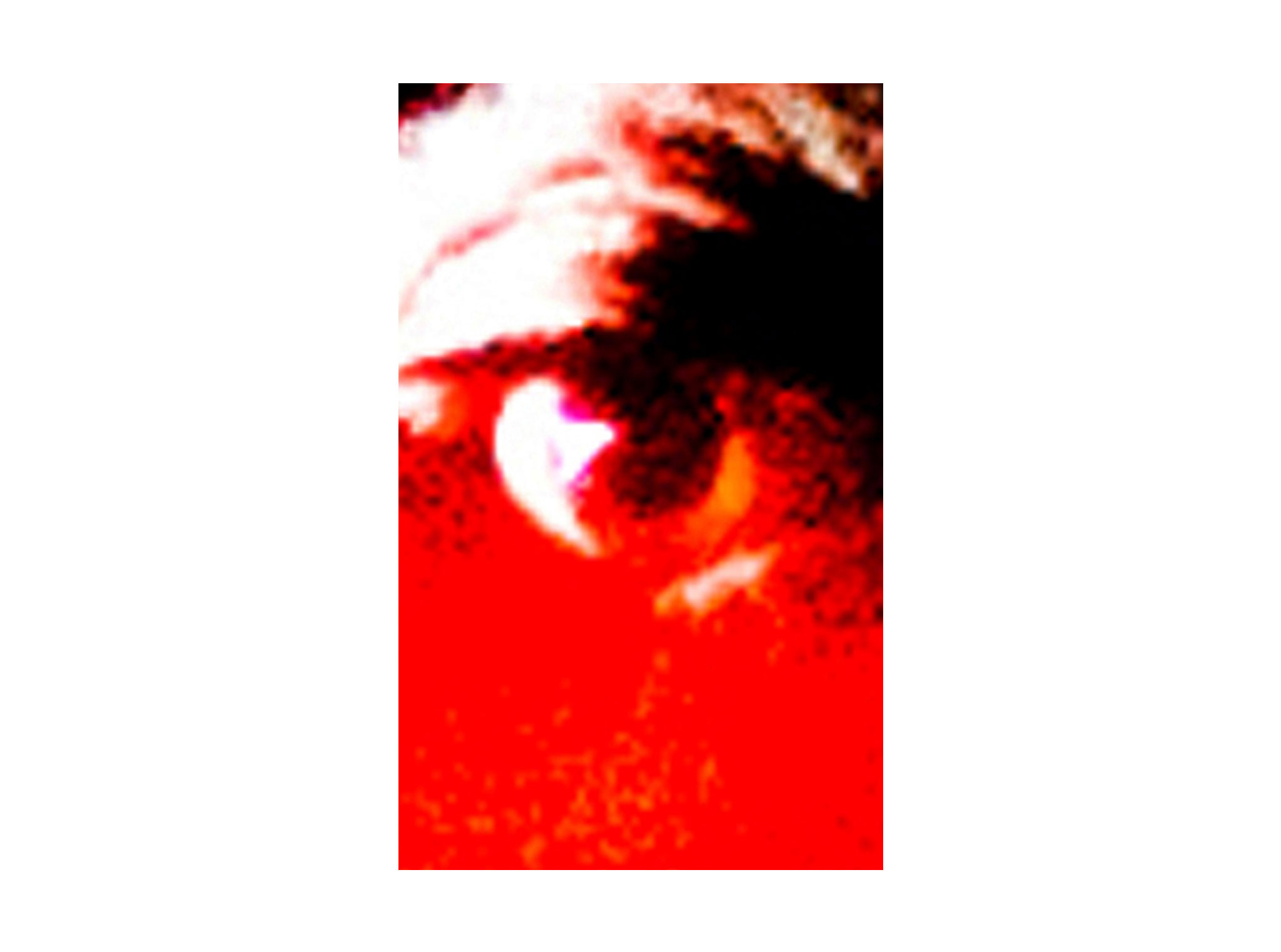(2012-2015)
“To the moon and back» is inspired by the motto found on the spanish Anti-Riot Police Unit website. A work that proposes, as its title, a journey around the space (of the image) which intention is to go through bodies to talk, from their own fragments, of the most in(di)visible part of physical and political control. A book that borns from a need to reflect about a global state of consumption and repression in which legitimate use of force and social protest and poverty criminalization are common elements, usually undercover by the name of security.The work focuses on the human condition of physical bodies of power, the distance they keep themselves from the demonstrators and the nature of his duty. All the images were taken during 2012 to 2014 during police charges happened after marches, strikes or demonstrations in Spain, and they gather into a book that started printing on July 1st, 2015, day that the New Security Law (Gag Law) came into force, and was published in September of that same year in collaboration with RVB Books.
(2012-2015)
“To the moon and back” está inspirado en el lema encontrado en la web de la Unidad de Intervención Policial Española, y propone, como su título, un viaje por el espacio (de la imagen) cuya intención es atravesar los cuerpos para, desde sus propios fragmentos, hablar de la parte más in(di)visible del control físico y político. Un proyecto que nace de la necesidad de reflexionar sobre un estado global de consumo y contención en el que el uso legítimo de la fuerza y la criminalización de la pobreza y la protesta son elementos comunes normalmente encubiertos bajo el nombre de seguridad. El trabajo se centra en la condición humana de los cuerpos físicos del poder, la distancia tomada frente a los manifestantes y la naturaleza de su trabajo. Todas sus imágenes fueron tomadas en España, del año 2012 al 2014, durante cargas policiales sucedidas tras marchas, huelgas o manifestaciones, y se reúnen en un libro que comenzó a imprimirse el 1 de Julio de 2015, día de entrada en vigor de la Nueva Ley de Seguridad Ciudadana (Ley Mordaza), y se publicó en Septiembre de ese mismo año en colaboración con la editorial RVB Books.

RVB Books/Mario Zamora, 2015
Editing & design: Mario Zamora
Tutoring: Julián Barón
16 x 26 cm
64 pages
Edition of 1000 copies

RVB Books/Mario Zamora, 2015
Editing & design: Mario Zamora
Tutoring: Julián Barón
16 x 26 cm
64 pages + 2 prints
Edition of 25 copies (spatial edition)
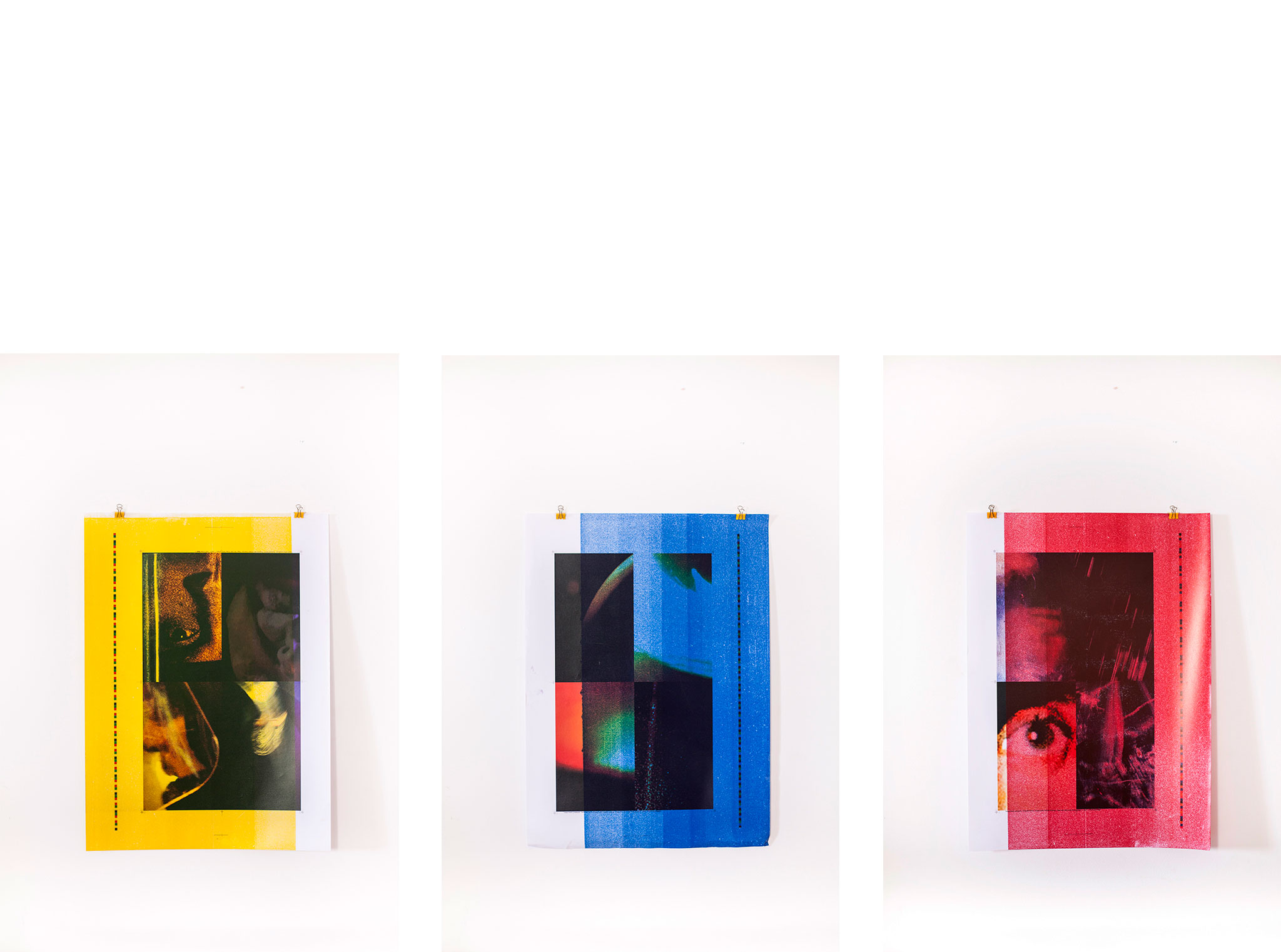
Waste copies derived from the book printing

Collective exhibition. Installation shots
Do It With Others, Prácticas autoeditadas en los lenguajes de la imagen. CentroCentro Cibeles. Madrid, 2015
The flowers
Footage from the 22nd of March, 2014. Riots after the marches of dignity
OUR PRECIOUS LIFE
Tell me, what else should I have done?
Doesn´t everything die at last, and too soon?
Tell me what is it you plan to do
with your one wild and precious life?
—
Mary Oliver
One could say that never in the history of mankind have so many people, at the same time and in so many places at once, had the feeling that this system did not work. That we live in a simulation. That all the people in charge are not the most prepared to be there and that they do not deserve it. That there is not a fair order in the state of things. And that if a being from outer space reached the Earth and needed to communicate with the most skilled interlocutor, he or she would never be the president of one of our nations.
We are not even talking about a minority any more, nor about a group of intellectuals formed in some great European city. Millions of citizens feel, although they cannot even agree with each other, that all values have been perverted, that no existing system of government makes any sense at all, and that most likely we are alone in this world.
This has something to do among other things, with the fact that for the first time in History we can observe the face of a young black man while he is being shot dead by the police in the United States of America, the face of a homosexual demonstrator in Moscow, or that of Julian Assange being kept in the Embassy of Ecuador in London. We are in contact with all things at once. And our bodies are obviously not prepared for this.
To feel this new kind of distrust and to be able to see it around you is disturbing. But somehow it also delivers certain happiness. Because it is always possible that this might herald the end of something, and therefore the beginning of something else. Yes, the beginning of something. And there is nothing we would like more than that.
When I’m standing before To the moon and back I cannot but think that we are part of a generation that has always lacked hope. I also think this makes us very different from the generation of our mothers and fathers, who could live The transition or The Movida. We, at least until those days around May 15th arrived, had put our efforts into creating small creative or social networks, shells that allowed us to live with as much dignity as was possible. We kept fighting to hold our ambitions alive. But we knew something inside us was broken.
And it may still be broken, it might be so that there is no way this could be put back together again in just a lifetime. But at least, after all of these days, a group of people can feel for the first time that the future might not be worse than the past.
Exactly as Theodor Adorno wondered wether poetry were possible after Auschwitz, we wonder wether love might be possible after capitalism. Because we have learned that one thing cannot be told apart from another, and that, in a way we haven’t yet fully understood, everything is connected.
I see the disfigured faces of the police corps in these photographs, and it is revealed to me that there are no politics that are not intimate, emotional, and that we need to put the faces back onto things again. This might be one of the biggest lessons of this century, that in this faraway virtual present our faces are the actual matter of politics.
This is why when I observe these images that secretly connect our skin, our small cells and particles, with constellations and celestial bodies, I understand that this is the desire of our time, to comprehend the hidden connections that exist between enormous things and the most insignificant ones. Between a tiny bubble of air caught in the shield of an antiriot policeman and a faraway planet following its orbit in space.
So I imagine the body of Mario taking these photographs, and I imagine him in foreshortening, his face stuck to the police helmets, sharing sweat with them, going after an image as who is searching for a revelation. An image that might help him understand better what he is doing there. And I think all of his life is there in that precise moment, concentrated in being able to share the workspace and working hours with these security corps. That photography is only an excuse to get closer, to push beyond the limit, to conquer at least this small space of freedom in which at last something is revealed to us and we manage to see it all under another light. This might be the miracle of this book, to make us see all of this in another way.
And I think this would be a good way of spending one’s lifetime, making some of us change the way we see something, which is what inspiration is about after all. And to take us there, helping us taking another small step, would be nice. It could be a possible plan for our one wild and precious life.
—
Celso Giménez. Writer and scene creator
NUESTRA PRECIOSA VIDA
Dime, ¿qué más debería haber hecho?
¿No mueren todas las cosas finalmente, y demasiado pronto?
Dime entonces, ¿cuáles son tus planes
para tu única, salvaje y preciosa vida?
—
Mary Oliver
Se podría decir que nunca en la historia del hombre tantas personas al mismo tiempo, en tantos lugares a la vez, han tenido la sensación de que este sistema no funciona. De que vivimos en un simulacro. De que las personas que están al cargo no son en absoluto las más preparadas o las que lo merecen. Que no hay un orden justo en este estado de las cosas. Que si un marciano llegara a la Tierra y exigiera comunicarse con el interlocutor más capaz, ese jamás debería ser el presidente de uno de nuestros países.
Ya no estamos hablando de una minoría o de un grupo de intelectuales bien formados en alguna gran ciudad europea. Millones de personas sienten, aunque ni siquiera estén de acuerdo entre ellas, que todos los valores están pervertidos, que ningún sistema de gobierno existente tiene sentido, y que probablemente estamos solos en este mundo.
Esto tiene que ver, entre otras cosas, con que por primera vez en la historia podemos observar cuando lo deseemos el rostro de un joven negro abatido por la policía en Estados Unidos, el de un homosexual manifestándose en Moscú, o el de Julian Assange retenido en la embajada ecuatoriana en Londres. Estamos en contacto con todas las cosas a la vez. Y nuestro cuerpo, naturalmente, no está preparado para esto.
Sentir esta nueva desconfianza y poder verla a tu alrededor es inquietante. Pero, sin duda, también nos genera cierta alegría. Porque cabe la posibilidad de que esto anuncie el final, y por lo tanto el principio, de algo. El principio de algo. Y nada nos gustaría más.
Cuando estoy delante de To the moon and back, no puedo dejar de pensar que formamos parte de una generación que nunca tuvo esperanza. Y creo que esto nos diferencia de forma radical de la generación de nuestros padres, que pudieron vivir “la transición” o “la movida”. Nosotros, al menos hasta que llegaron aquellos días alrededor del quince de mayo, nos habíamos concentrado en crear pequeñas comunidades artísticas o sociales, caparazones vitales que nos permitieran vivir con la mayor dignidad posible. Nos esforzábamos por mantener nuestra ambición. Pero sabíamos que algo dentro de nosotros estaba quebrado.
Y quizás todavía lo está, es posible que esto no pueda sanarse del todo en una sola vida. Pero al menos, después de esos días, un grupo de gente pudo sentir por primera vez que cabía la posibilidad de que el futuro no fuese peor que el pasado.
Del mismo modo que Theodor Adorno se preguntaba si es posible la poesía después de Auschwitz, nosotros nos preguntamos si es posible el amor después del capitalismo. Porque hemos aprendido que ya no se puede diferenciar una cosa de la otra y que, de un modo que aún no acabamos de comprender, todo está conectado.
Veo los rostros desfigurados de los cuerpos policiales en estas fotografías, y se me revela casi sin darme cuenta que ya no hay política que no sea íntima, que no sea emocional. Que tenemos que volver a ponerle rostro a las cosas. Que con suerte esa es una de las grandes lecciones de este siglo, que en este presente lejano y virtual son nuestras caras la verdadera materia de la política. Por eso cuando observo estas imágenes que enlazan secretamente nuestra piel, nuestras pequeñas células y partículas con las constelaciones y los gigantes cuerpos celestes, entiendo que ese es el anhelo de nuestro tiempo, comprender las conexiones escondidas entre lo más grande y lo insignificante. Entre una pequeña burbuja de aire atrapada en un escudo antidisturbios y un planeta lejano que parece orbitar en el espacio.
Y entonces imagino el cuerpo de Mario tomando estas fotografías, y lo imagino en un escorzo complicado, con el rostro pegado a los cascos policiales, compartiendo casi el sudor con ellos, persiguiendo una imagen como quien persigue una revelación. Una imagen que le ayude a comprender qué está haciendo exactamente en ese lugar. Y pienso que en ese preciso instante toda su vida está ahí, concentrada en poder compartir horario y espacio de trabajo con esos cuerpos de seguridad. Que la fotografía sólo es una excusa para acercarse más de la cuenta, para estirar los límites, para conquistar al menos ese espacio de libertad en el que por fin se nos revela algo y conseguimos verlo todo de otra manera. Y quizás ese es el milagro de este libro, hacer que veamos este paisaje de otra manera.
Y pienso que esa sería una buena manera de ocupar una vida, hacer que algunas personas cambiemos nuestra forma de mirar algo, que eso es al fin y al cabo la inspiración. Y que acompañarnos hasta allí, poder ayudarnos a dar simplemente un paso más, sería bello. Sería un plan posible para nuestra única, salvaje y preciosa vida.
—
Celso Giménez. Escritor y creador escénico

